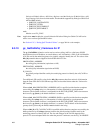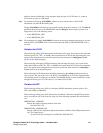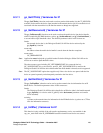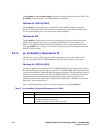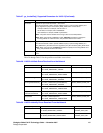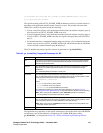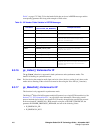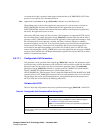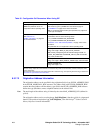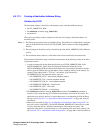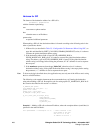
Dialogic
®
Global Call IP Technology Guide — November 2007 459
Dialogic Corporation
gc_SetConfigData(GCTGT_GCLIB_CHAN,ldev,t_pParmBlk,0,GCUPDATE_IMMEDIATE,&request_id,EV_SYNC);
gc_util_delete_parm_blk(t_pParmBlk)
The specific meaning of the GCEV_INVOKE_XFER termination event for successful transfers is
dependant on the application and the transfer scenario(s) it uses. The possible outcomes when
Global Call is used by all parties include the following:
• If party A drops the primary call in unattended transfers before the transfer completes, party A
does not receive any GCEV_INVOKE_XFER event at all.
• If party B drops the primary call in unattended transfers before the transfer completes, party A
receives a GCEV_INVOKE_XFER event that only signifies that party B has sent INVITE to
party C.
• For attended transfers or unattended transfers where the primary call is maintained during the
transfer, party A receives a GCEV_INVOKE_XFER event which indicates that the transferred
call was actually connected between party B and party C.
Table 32 identifies the protocol-specific variances in parameters for gc_InvokeXfer( ).
The application may optionally set the specific information in the header fields of the SIP REFER
message that is sent by this function by configuring a GC_PARM_BLK before calling
gc_InvokeXfer( ), as described in Section 4.9, “Setting and Retrieving SIP Message Header
Table 32. gc_InvokeXfer( ) Supported Parameters for SIP
Parameter Meaning
crn The CRN of the call between party A and the remote party receiving the transfer request.
This is the primary call in an unattended (blind) call transfer, but may be either call for an
attended (supervised) transfer.
extracrn For an attended (supervised) call transfer, the CRN of the call between party A and the
remote party not receiving the transfer request (i.e. the call not specified in the crn
parameter).
For unattended (blind) call transfers, must be zero.
numberstr For attended (supervised) call transfers, this parameter is ignored. Set to NULL.
For an unattended (blind) call transfer, the address of party C (the rerouting address, which
will be signaled to party B) as a string. This address is of the form
user@host; param=value
where
• user is a user name or phone number
• host is a domain name or IP address
• param=value is an optional additional parameter
For additional information on rules for destination addresses, see Section 8.3.17.3,
“Forming a Destination Address String”, on page 465 under the “Variance for SIP” heading.
Note: When using the GC_MAKECALL_BLK *makecallp parameter to specify the
rerouting address, this parameter must be set to NULL.
makecallp For attended (supervised) call transfers, this parameter is Ignored. Set to NULL.
For an unattended (blind) call transfer, the address of party C (the rerouting address, which
will be signaled to party B) as a GC_MAKECALL_BLK data structure.
Note: When using the char *numberstr parameter to specify the rerouting address, this
parameter must be set to NULL.
timeout Ignored. Set to NULL.




